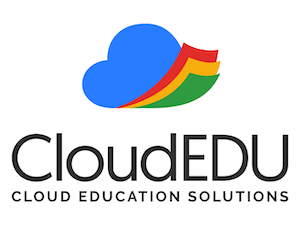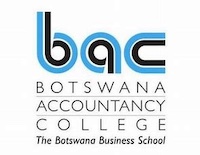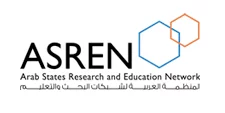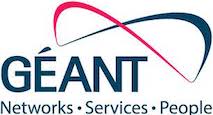
Gaborone, Botswana,
November 24-25
Theme: Redesigning the Digitalized African College and University
What is a digitalised college or university? Several years ago, it simply involved shifting from analog data and records (eg, paper journal and books) to digital media (eg, e-repositories and library e-materials) or from paper-based process to online processes (eg, student registration). Whereas African colleges and universities are in different stages of the digitalisation process converting existing analog processes into digital ones, they must move to next level to create, new and innovative processes and capabilities based on current and emerging digital technologies.
This involves evaluating and assessing the feasibility of potential innovations, selecting those most useful, and prioritising them based on the benefits and added value they offer to colleges, universities and their broader communities. The process should be captured in agreed upon, well thought out, digital strategies lead to higher efficiency and increased impact of the universities to society.
The UbuntuNet-Connect 2022 conference theme looks broadly at the issues surrounding the redesign of digitalised colleges and universities in Africa. Keynote speeches, panel discussions, and paper presentations will address topics and anchor discussions on where we have come from, where we are today, where we should be heading, and the challenges and opportunities we face along the way.
Topics
Under the general conference theme, broad topics include
- digital technologies (for teaching, learning, assessment, research, administration),
- connectivity,
- digitization in administration,
- the digital library,
- digital transformation of research,
- digital transformation of teaching and learning,
- digital literacy (of students, staff, and faculty),
- digital resources,
- devices and infrastructure (hardware, software, IaaS, SaaS, cloud services),
- digital content and content quality assurance,
- institutional collaboration leveraging on Research and Education Networks,
- access to X (=connectivity, devices, content, …), and
- supportive policy and regulatory frameworks.
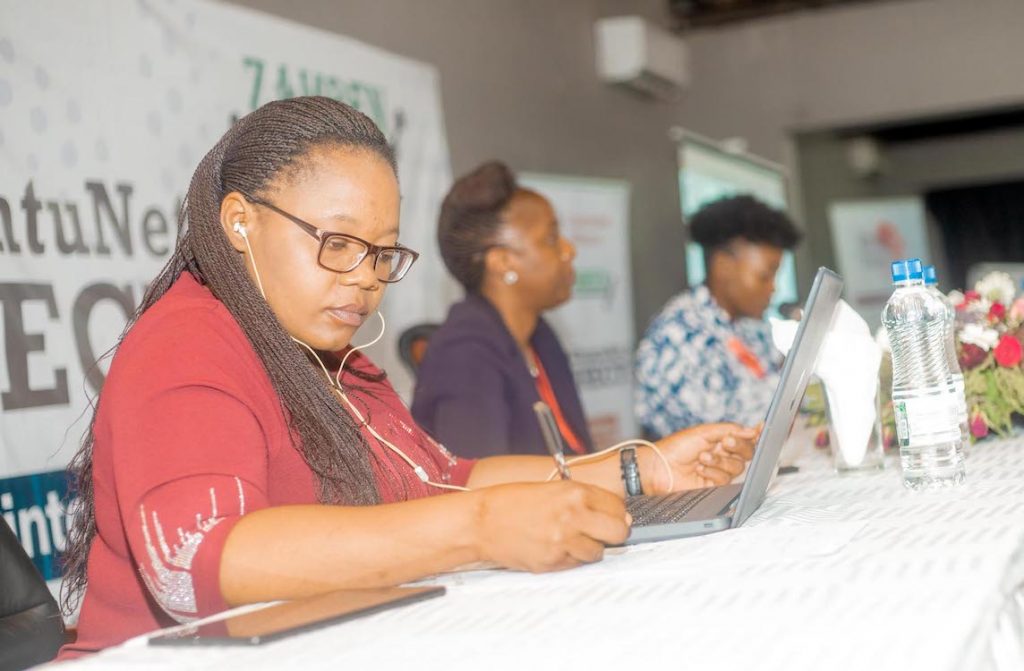
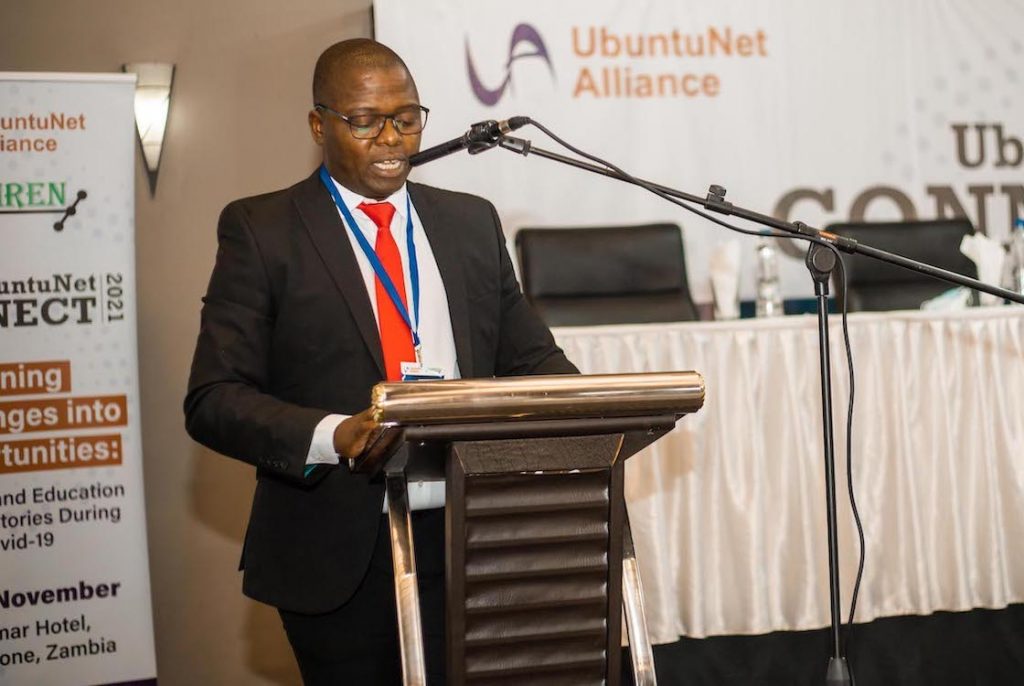
Guest of Honour and Keynote Speakers
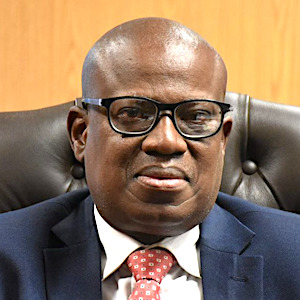
Hon. Thulagano Merafe Segokgo,
Minister of Communications, Knowledge and Technology,
Government of BOTSWANA
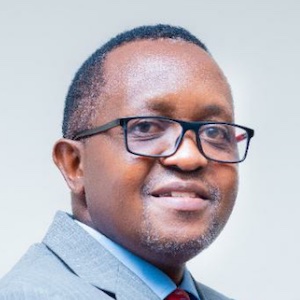
Chimwemwe David Matemba
Project Manager – Digital Malawi
Public Private Partnership Commission
MALAWI
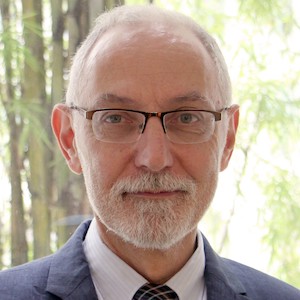
Dr Kostas Glinos
Independent expert in Science, Technology and Innovation policy

Paul Rouse
Chief Community Relations Officer
GEANT, UK

Blessing MAWIRE,
Partnerships Coordinator: Hidden Collections Initiative, Council on Library and Information Resources (CLIR), Alexandria, VA
Based in Pretoria, SOUTH AFRICA

Sabine Jaume-Rajaonia
International and Strategy Director
RENATER, FRANCE
PRE-CONFERENCE PROGRAMME (BY INVITATION ONLY)
22 November
Invitees from ASREN, EU, GEANT, UA, RENATER, and WACREN
23 November
[THIS EVENT HAS BEEN POSTPONED TO NEXT YEAR] UbuntuNet Alliance, supported by GÉANT and the European Commission Directorate-General for International Partnerships, has convened a Nexus meeting to foster cross-cutting multisectoral- multilevel collaborations and support ongoing coordination for the Research and Education community in Africa. The meeting will focus on sustainability and development of the Regional- National Research and Education Networks in support of the African Union Agenda 2063.
Implementing Open Data in accordance with the FAIR and CARE Principles for Data Curation. Havemann, Jo
[Closed training for librarians. By invitation only.]
 | Trainer: With a background in Evolution and Developmental Biology, Dr. Jo Havemann is a trainer and consultant in [Open] Science Communication and [digital] Science Project Management. Her work experience covers NGOs, a science start-up and international institutions including the UN Environment Programme. With a focus on digital tools for science and her label Access 2 Perspectives, she aims at strengthening global science communication in general – and with a regional focus on Africa – through Open Science. |
Open Data and Research Data Management (RDM) according to the F.A.I.R. principles (Findable, Accessible, Interoperable, Reusable) are increasingly demanded by research funders, scientific publishers and universities. The creation of a data management plan (DMP) before the start of a project not only saves time in filing and archiving the collected research data, but also increases efficiency, transparency and reproducibility of the research results over the entire course of the project. In this workshop will discuss the following:
- Digital tools, platforms and services that facilitate operand FAIR data curation at the institutional and project specific level.
- Existing systems deployed at the national and institutional level in Africa and how those can be complemented with general cloud-based scholarly repositories to increase and foster discoverability as well as reuse of African research data while at the same time protecting the data from misappropriation through open licensing.
- CARE Principles for Indigenous Data Governance to consider aspects of Collective Benefit, Authority to Control, Responsibility and Ethics.
[CLOSED MEETING BY INVITATION ONLY]
CONFERENCE PROGRAMME
24 November
SESSION CHAIR: Prof Madara OGOT, CEO UbuntuNet Alliance
- Announcements – MC
- Opening Prayer – Vice Chair BotsREN
- Introductions – CEO UbuntuNet Alliance
- Welcome remarks:
- Prof Madara OGOT – UbuntuNet Alliance CEO
- Prof Shedden Massupe – BotsREN CEO and Chairperson
- Introduce members of the Botswana Local Organising Committee
- HE Petra Pereya – European Union Ambassador to the Republic of Botswana and SADC
- Prof Stephen SIMUKANGA – UbuntuNet Alliance Chairperson
- Opening Speech and Official Conference Opening by Guest of Honour
- Hon. Thulagano Merafe Segokgo, Minister of Communications, Knowledge and Technology, Government of Botswana

Honourable Thulagano Merafe Segokgo is the current Minister of Communications, Knowledge and Technology. He has served as the Minister of Transport and Communications from November 2019 until April 2022. Having studied Computer Science at the University of Manchester, places Honourable Segokgo among the highly knowledgeable and skilled citizens in the ICT space. Armed with a wealth of experience from the private sector, Honourable Segokgo is a value-add to this Ministry following his stint as an ICT consultant in the private sector. As passionate as he is, he comes at a time when the country is transforming towards 4th Industrial Revolution. An intellectual and ICT specialist par excellence, Honourable Segokgo initially graduated in Mathematics from the University of Botswana in 1987 and subsequently in Computer Science. Before joining Government, the highly experienced Segokgo was a practicing ICT consultant specializing in architecture, design, development and integration of software solutions. Honourable Segokgo has also taught Mathematics and Computer science at university level. Minister Segokgo is highly passionate about ICT and is eager to play a significant role in the transformation of ICT sector. He is currently the Chairperson of the Cabinet Task Team on Strategic Thrusts which is mandated to propel the country into a high income economy. Minister Segokgo has served in several Boards and Committees such as among others, being a Board member of Immigration Sector- Specific Board and was also a member of Ministry of Infrastructure, Science and Technology Sub High Level Consultative Committee.
- Token of appreciation for the Minister
- Keynote: Towards the Digitalization of Institutions of High Learning – A Few Lessons from the Malawi Experience. MATEMBA, Chimwemwe David. Project Manager – Digital Malawi, Public Private Partnership Commission, MALAWI

Chimwemwe Matemba, is an inquisitive ICT public investment specialist with more than twenty years in this sub-sector. He is an accidental, by virtue of leading public sector network connectivity initiatives, 4IR EdTech practitioner. He has accrued his most recent experience leading World Bank digitization projects in Malawi. Prior to that, Matemba worked for the Government in Botswana managing ICT policy and infrastructure programs. He also worked at the local ICT regulator in Malawi, in the early days of his career. Matemba believes that, as developing nations, we are fully ready to harness the opportunities that the emerging digital technologies offer.
Session Chair: Stein Mkandawire, ZAMREN
- Knowledge, skills and competencies of the library information science schools’ graduates on digital scholarship – Mr SIBIYA, Philangani, (UNISA, SOUTH AFRICA)
The Fourth Industrial Revolution has presented a shift in a paradigm in the LIS field. There are digital scholarship knowledge, skills and competencies that are evident in the library and information science profession. Specially, academic and special research council libraries have reintroduced their functions and activities regarding digital scholarship to accommodate the needs of the 4IR. This calls for librarians practicing in these types of libraries to revisit their knowledge, skills and competencies. Most of the librarians who have been trained in LIS profession by LIS schools received their qualifications before the down of the digital scholarship activities in the LIS profession. This presents some uncertainties as far as digital scholarship job requirements are concerned. This paper is part of a doctoral study that aimed at exploring education and training of library and information science professionals on digital scholarship in South Africa. Specifically, this paper purposed to examine the knowledge, skills and competencies of LIS schools’ graduates on digital scholarship from academic and special research council libraries in South Africa. The study adopted an interpretive paradigm using a qualitative approach to achieve the aim of the study. A multiple case study design was utilized through semi structured interview as a data collection tool. Ten digital scholarship librarians were interviewed. The knowledge, skills and competences of digital were sought as job requirements from participants. Digital scholarship units and activities were also sought as they directly influence the sets of skills and knowledge required for digital scholarship librarians. The study concluded that LIS digital scholarship librarians should have digital scholarship knowledge, skills and competencies. This can be done through education and training in a form of formal education, training courses, workshops and on job training. The study recommends that LIS schools develop short learning courses as means to assist librarians in gaining relevant knowledge, skills and competencies. Librarians should be willing to learn and parent organisation should acquire the relevant infrastructure and provide funding for training.
- Transformation of public libraries: moving towards smart libraries in South Africa – Dr MODIBA, Mashilo, (UNISA, SOUTH AFRICA)
This study sought to explore how libraries are transforming towards been smart libraries in South Africa. Smart library is a library without a single physical lending item on the shelves, without books in print, library without shelves, just large cool servers, whirring digital archives linked
through digital networks with machines for copying and distribution. Smart libraries are more relevant especially in the fourth industrial revolution (4IR). Communities can also benefit from the smart library services particularly during the Covid 19 pandemic. The study relied on the literature review and may produce results that would help libraries transform towards smart libraries in South Africa. A framework on how libraries can transform towards smart libraries will be proposed to assist libraries in terms of transformation in South Africa. - Digital Library: The University enabler for sustaining teaching and learning in the 21st Century – MURAHWA, Ronny, (Zimbabwe Research and Education Network, ZIMBABWE)
The Harare Institute of Technology (HIT) Library was established as a university library in 2005. The library of HIT has been positioned to operate as an ideation and nerve centre of the Institute. It is an oasis of knowledge with a collection of materials ranging from printed books and journals, e-resource databases, government documents, audio visual materials like DVDs as well as newspapers. The purpose of this study was to examine users’ views about the usability of digital libraries current and perceived importance. The use of Moodle and library digital platforms as a source of information for students during the COVID period. The main objectives were to examine the benefits of using HIT digital library and Moodle platform; to identify challenges students face in using HIT digital library and Moodle educational platform; and determine possible solutions to the challenges in the use of digital library in line with social distancing scenarios. - Evolution of open access repositories in Africa for sustainable sharing of research output – DULLE, Frankwell, (Sokoine University of Agriculture, TANZANIA)
Open access repositories constitute databases with a set of services to capture, store, index, preserve and re-distribute scholarly output in digital formats free of charge to end users. Though lagging behind, African countries like other developing nations are emulating the developed world in establishing open access repositories as a way to improve sharing of research output. This paper reviews open access adoption in Africa with special attention to openly accessible digital repositories. The growth in terms of the number of digital repositories as well as content is assessed from 2015 to 2022 in order to predict the sustainability of research findings’ dissemination in the content for the development of knowledge. Possible factors contributing to growth of open access repositories are discussed. The paper further discusses how interventions at country and institutional levels can contribute to sustainable growth of repositories’ content from Africa for global contribution to knowledge.
Session Chair: Nicholas Mbonimpa, RENU
Advancing transformative e-Learning for African education networks – GAKOU, Niouma (Education Technology Consultant) and KHAN, Stan (Business Development Director)
Digital transformation may seem like a pipe dream for many African schools due to inadequate and unsustainable Internet connections, which risks leaving some African students behind. Therefore, national digitization initiatives are currently unable to harness the most transformative aspects of this technology. UbuntuNet is working to improve African educational internet connectivity with its backbone network delivering bandwidth to an ever-growing set of National Research Education Networks (NRENs). By combining this with web caching, UbuntuNet is even better positioned to improve basic and higher national education systems across the continent. By fixing ‘the Connectivity Problem’ using web caching, African educators are unleashing the power of independent, data-driven, adaptive learning approaches, even in the most rural schools. Connecting your NREN’s schools to the UbuntuNet network alongside a caching device delivers better value for money; the UbuntuNet connection is most efficient when storing and serving content locally. In fact, it is the best way to improve capacity and control the bandwidth used by each NREN, as well as linking educational institutions to a reliable, shared internet connection. For UbuntuNet – Give more capacity without investing in more backbone transmission infrastructure; for NRENs – Support more institutions and users in your country with the capacity provided by UbuntuNet; for Institutions – Support more classrooms with the limited capacity UbuntuNet provides; and for Teachers and Learners – Use online content with confidence that it will work reliably, fast enough to avoid disrupting lessons.
Tanzanian digital technologies in teaching, learning and research process: Availability and Coverage – CHOGO, Pamela, (Nelson Mandela African Institute of Science and Technology, TANZANIA)
In recent years digital technologies have changed the way various operations are taking place in the academic space commonly referred to as teaching and learning environment. Distance is no longer a barrier in accessing education and knowledge contents from anywhere in the world. This has made high quality academic contents become available and affordable. Furthermore, the digital technologies have also simplified assessment activities, research publishing and academic administration. Various educational and academic institutions are finding ways to implement digital technologies in their daily activities. some are developing their own solutions while others go for off the shelf solutions. On the other hand, there are independent educational technology solutions that are not affiliated with any educational or academic institution. Most of these are available online and one can access from anywhere in the world. Despite the availability of these digital technologies in academics, many platforms and solutions available originate from developed countries. This means in Tanzania and other African countries most of the contents consumed and administrative platforms available do not very much related to the kind of teaching and learning taking place in the country. In addressing this challenge, several Tanzanian startups and learning institutions have decided to innovate their own educational technology platforms. These platforms are designed to meet specific requirements of the Tanzanian learning environment. Which means they relate to the academic systems and syllabuses in place. They are also known by the Tanzanian Commission for Science and Technology (COSTECH) which is responsible for overseeing technological innovations in Tanzania. Some of them are even known by the ministry of education and work hand in hand with the education system in Tanzania.
Currently there are eleven known educational technology platforms designed with different coverage and context. Some have contents for secondary schools and some have skills training contents. Furthermore, there are various academic institutions with educational platforms that support research and publication. These are commonly referred to as repositories. They allow easy access to research publications. This study intends to performs an evaluation of educational technology and repository platforms available in Tanzania. It looks at how many platforms are available, what challenge they solve, who the developers and users are, what contents are available, the mode of content presentation, when the contents are available (online or offline), the technology used and whether the platform is available for free or users need to pay to access it. Furthermore, the study will also assess the available legal and policy framework in the development and use of educational technology platforms for academic matters. For this case, the study looks into eleven educational technology platforms developed by startup companies in Tanzania and repositories from identified higher learning institutions in Tanzania. The platforms are used for teaching and learning at different levels, but also some are used for assessment, academic administration and research. This study will identify the state of locally made educational technology platforms. It will also be able to identify gaps that need to be filled by startup players, colleges and universities, research institutions, students, teachers, parents, NREN community and governments. This will contribute in improving the use of digital technologies in teaching, learning and research activities.
Assessing The Awareness by Learning Institutions of other Digital services other than Internet Connectivity offered by NRENs: A Case of ZAMREN and ZIMREN – CHAAMWE, Nchimunya (The Copperbelt University, ZAMBIA); Mr MATANDAVARI, Mainford (Harere Institute of Technology, ZIMBABWE); MKANDAWIRE, Stein (ZAMREN, ZAMBIA)
A National Research and Education Network (NREN) is a specialized ICT provider that exists in a country to provide internet and advanced ICT services to the country’s research and educational institutions on a non-profit basis. These NRENS have contributed or are contributing immensely in the digitization process of learning Institutions in the countries they are operating in. In Zambia there is ZAMREN, Zambia Research and Education Network that started its operation in 2012 and has grown to become one of the leading Internet Service Provider for Higher Education and Public Research Institutions in Zambia. Other than providing internet Services, ZAMREN has added a number of other ICT solutions such as Mail Hosting, Web hosting, Domain and DNS hosting, Federated Identity, High Performance Computing, Eduroam as well as the Moodle Learning Management Platform. In Zimbabwe there is ZIMREN, Zimbabwe Research and Education Network. ZIMREN apart from providing Internet services has also added a number of digital services such as Shared Services, Capacity building, Eduroam and Professional Services. The main purpose of this paper is to highlight the awareness and adoption levels by education institutions in Zambia and Zimbabwe of these other services offered by ZAMREN and ZIMREN respectively. The paper will then propose measures that can be taken by the NRENs working in conjunction with Learning Institutions on ensuring that these other ICT services are assimilated and used by concerned learning Institutions and the academic staff in these institutions.
Status of Implementation of UNESCO Open Science Recommendations – Towards a Open Science Vision – Panelists (tbc) African Open Science Platform (AOSP), International Science Council, SADC, The Open Access Data Center (OADC) – SASSCAL, African Publishers Network, AAU /PLOS/ TCC AFRICA, UNESCO
The UNESCO Open Science Recommendations “..Define shared values and principles for Open Science, and identify concrete measures on Open Access and Open Data, with proposals to bring citizens closer to science and commitments to facilitate the production and dissemination of scientific knowledge around the world..” The Recommendations also state that “The Recommendation on open science emphasises the transformative potential of open science for reducing the existing inequalities in science, technology and innovation, for accelerating progress towards the achievement of the United Nations Sustainable Development Goals and fulfilling the human right to enjoy the benefits from scientific progress and its applications.” Globally there is movement in the trajectory of developing a Global Open Science Cloud (GOSC) aimed at supporting research collaborations across continents to assist in addressing global science challenges – for example UN Sustainable Development Goals (SDGs), climate change, infectious diseases, and coordination of global disaster risk reduction. Continents, regions, and countries are also actively developing Open Science platforms and investing in underlying cyber-infrastructures to advance their Research Science Technology and Innovation (RSTI) ecosystems, enhance collaboration and increase their competitiveness and critically, use RSTI as a driver for national and continental priorities. Progress towards the achievement of this vision varies across the globe with many political, geographical and cultural factors influencing the status. The Panel of experts will interrogate state of affairs in the implementation of the UNESCO Open Science Recommendations around the world and in the African continent
- What progress has been achieved to date and what are the major remaining challenges?
- How can we bridge the gap across different science policies (Nationally, Regionally and continentally?
- What can be done to support different stakeholders from various regions to ensure that progress is made, and lessons are shared?
- What is the direct role of data in supporting the direct open science and open research vision?
- What is the status of Data values i.e. Data as a route to inclusion and equity, Data that is well-governed, Data that powers sustainable and equitable development?
- What should be key recommendations and requirements regarding operationalizing open science? Who should do what? Governments, institutions, Development Partners, Donors and Funders, regional and Continental Bodies
- How can/is Open Science be used to foster collaboration and joint action?
Session Chair: Frank Seth, TERNET
- Digitalization of Botswana higher education institutions: the way forward post COVID-19 – Dr MOLEFE, Dorcas and Dr KGWEFANE, Tshepo A. (Molepolole College of Education, BOTSWANA)
Across the world, the outbreak of the Covid-19 pandemic in 2020 negatively affected human beings in all spheres of lives. The higher education sector was not spared as colleges and schools closed down during lockdowns that were meant to curb the spread of the virus. The pandemic rendered the face-to-face mode of offering education practically impossible. Some developed countries with provision for online education swiftly transited to e-platforms. However rushed, and beset with challenges, this ensured continued interaction between educators and learners. On the contrary, in some developing countries, with limited information and communication technology, such as Botswana, there was no alternative mode and teaching and learning came to a halt for some time. The level of preparedness was too low to quickly adopt the high level of need for technology usage in higher education, let alone nationwide. Educators and trainees in higher education institutions, such as those responsible for teacher training and development, missed out on the critical contact time that had been effected through the face-to-face interaction. Teacher trainees lost out on important content they need for their future as professional teachers. They could not acquire the practical experience embedded in their training activities, such as peer teaching, teaching practice and empirical research. The reopening of these institutions was afflicted by ‘stops and gos’ as educators and trainees alike were either victims of the virus or immediate contacts. Either of these meant isolation and absence from college. Such absences affected continuity and created assessment challenges. To comply with the social distance protocols leading to shortage of staff and other physical resources such as lecture rooms in most institutions. Besides, both teacher educators and trainees were emotionally drained to fully apply themselves upon resumption of classes. The quality of teacher training and development was therefore compromised.The article reflects on the impact of Covid-19 on education in Botswana Colleges of Education. It reviews global literature to appreciate how different countries responded to the negative effects of the pandemic. It argues that the extent of the impact could have been lessened by the availability of an alternative mode of offering education provided for by online education platforms. The article advocates for the introduction of a hybrid model that promotes face-to-face and online interactions in higher education institutions in Botswana. The significance of the paper is that experiences shared in the paper are to help policy-makers to appreciate how Covid-19 impacted on teaching and learning and teacher professional development at colleges of education in Botswana. This could prompt the policy makers to review the pace at which technology is being integrated in higher education and consider expediting the processes of integrating technology in higher education. Policy makers would further reflect on the adequacy of the current national information and communication technology (ICT) in facilitating technology integration in higher education institutions. This is important in light of reports indicating that Covid-19 is not going to go away any time soon and remains a potent threat. In addition, the paper will add to existing literature on the role of ICT integration in higher education under the depressing circumstances presented by the Covid-19 pandemic and related circumstances.
- Digitization in university administration – CHAHURUVA, Miriam and MUTANDAVARI, Mainford (Harare Institute of Technology, ZIMBABWE)
As institutions embrace and embark on the digital transformation journey, the process begins by digitization of information from analog to digital. The digitization phase is followed by digitization process and digital transformation. There is no digitization and no digital transformation of an entity without digitization phase. Universities have various administrative systems to manage the operations of the business. As universities embark on the digital transformation journey which begins with digitization, the value proposition has to be clearly outlined. Digitization in the university administration is to be designed to improve efficiency, increase quality of service and customer experience. This is possible through the use of ICTs in every area of administration by reviewing of existing systems and practices and even culture due to the changes in the way of doing business. Digitizing makes it easier to preserve, access, control, secure and share information. By digitizing workflows, universities are able to optimize existing processes, enhancing access, control, security, and collaboration, ultimately transforming the entire business to a digital university. Digitization in the administration of university systems enables administrative procedures to be conducted without any geographic or time constraints, thus contributing to increased comfort and convenience for the stakeholders. Digitization in administration, lead to electronic delivery of administrative information, electronic filing, electronic documents causing an elimination of paper-based documents and information sharing and use. Digitization ensures that, should paper documents become lost or damaged, electronic documents will remain accessible.
Digitization is inevitable as institutions have to engage and work with the other business entities who are moving with the technology trends and hence university administrative systems must be in sync with the technologies available on the market to remain competitive. Any given institution embarking on digitization must take into consideration the availability of infrastructure, equipment and skills set for all administrators and users of the system and policies to support and enforce digitisation. There is need for reliable network infrastructure, internet connectivity, provision of devices such as desktops, laptops, printers. Apart from infrastructure the administrative staff need to have relevant digital literacy skills relevant for the systems in place due digitization through training programs. Indicators of the level of digitization and usage of ICTs in the administration of a university can be measured by infrastructure available, number of online administrative procedures for services, access to information, devices for use, staff proficiency, web presence among other measures. As digitization is being achieved, digitalisation follows through the use of digital technologies and information to transform university administrative operations and systems. Having gone through the digitization phase and digitization process, digital transformation journey is on course. This is a series of deep and coordinated culture, workforce, and technology shifts that enable new educational and operating models and transform an institution’s operations, strategic directions, and value proposition. Each institution going through the digitization phase should have a clearly defined strategy and road map to follow to ensure success in meeting changing business and market requirements in embracing technology.
- Africa Digital Campus Project: Contribute to strengthening the e-learning offer of higher education and research universities using the capabilities of NRENs – ALLINE, Damien, (Institute for Research Development, FRANCE)
The Africa Digital Campus project, led by the Institute of Research for Development (IRD) and the West and Central African Research and Education Network (WACREN), in partnership with the Agence Universitaire de la Francophonie (AUF), aims to establish rapid cooperation with two West African countries, Burkina Faso and Benin, with a view to strengthening the e-learning offer (distance learning) of universities. It thus aims to contribute to and ensure the continuity and quality of higher education and research in a context where the role of digital technology in achieving these two objectives has been exacerbated by the COVID-19 health crisis. The funding amount of the project is 2,85 million euros and started in March 2022 for a duration of 24 months. Many African countries have embraced distance education as a means of addressing the challenge of citizen education and the massification of higher education that they face, with several distance learning centres and virtual universities established over the past decade. But the critical issue of the availability of adequate IT infrastructure and advanced services to enable access to resources, to facilitate learning processes and assessments, persists on the continent. This has been highlighted by the current COVID 19 crisis, with millions of African students denied access to campuses. At the same time, affordable access to adequate connectivity remains a challenge as very few research and higher education institutions are currently connected to NRENs, due to the high cost of last mile connectivity and inefficient campus networks. About 100 teacher-researchers in Burkina Faso and Benin are being trained and accompanied until the production of at least one course (teaching unit) each. The teachers are autonomous in designing and disseminating the e-learning courses. The network connectivity and learning platforms of UVBF and ADN in Benin are strengthened: about 1,000 students from Burkina Faso and Benin connect and use a quality e-learning offer at a distance. Knowledge sharing is taking place between the two countries, and even at the regional level (via WACREN): the decision-makers are convinced of the relevance of the system deployed to go to the national level.
- Role of CSIRT in an NREN – KAWUMA, Daniel, (Research and Education Network of Uganda, UGANDA)
CSIRT is the Cyber Security Incident Response Team, which is a group of IT professionals charged with the responsibility of overseeing the security of digital information and handling computer security incidents as they occur, disseminating cybersecurity advisory information, and organizingcybersecurity awareness training to mitigate the impact of security threats within the NREN. For any upcoming or established NREN, instituting a CSIRT, just like the Network Operations Center (NOC), must be an objective in the operational playbook in this day and age. The digital age we are currently in has come at the cost of exposing sensitive information to unintended third parties, which can be detrimental to the NREN in a myriad of ways including ransomware attacks, denial of service attacks, identity theft, and information leakage, among others. The role of the CSIRT stretches beyond the NREN secretariat to the connected member institutions. From a broader perspective, it’s a fact that member institutions comprise a large number of end users, with little or no knowledge about cyber safety, which is very harmful to their online health. It’s no secret that member institutions run numerous critical systems such as payment systems, human resource management systems,admission systems, among others which require protection against cyber threats. The case study in this scenario is the RENU-CERT (Computer Emergency Response Team). It’s the CSIRT for the Research and Education Network for Uganda (RENU) established in 2019 to be the hub for addressing cybersecurity incidents on the RENU network. Between 2019 and 2020, the percentage of abuse reports about botnet activities, compromised assets, email compromise, hosted phishing websites, and IP blacklistings on the RENU network reduced by 15%. By the close of 2021, the decrease in the number of abuse reports was by 82%, which is drastic. Similarly, in 2019, a total of three (3) (distributed) denial of service (DDoS) attacks resulting in severely degraded network performance were identified, mitigated, and recorded by the RENU-CERT. DDoS attacks of the same kind were not experienced the following years since measures were implemented to combat them. Therefore, the trend depicted by the collected statistics justifies the impact of the CSIRT within an NREN. Additionally, the establishment of a CSIRT is a potentially lucrative investment targeting the cybersecurity niche. With the inevitable competition for Internet connectivity between commercial Internet Service Providers (ISPs) and NRENs on a continuous rise, any potential source of revenue for a not-for-profit NREN is a great financial boost. Owing to that fact, the services offered by a well-established CSIRT can be leveraged as an additional income stream for NRENs of any maturity. At the age of three (3) years, the RENU-CERT has introduced a number of services and some are now potential income streams to RENU. The overall goal of the presentation is to share with the African NRENs the importance of the CSIRT within an NREN, how to establish and grow a CSIRT, the role of the CSIRT in the NREN community, and how the CSIRT can act as an income stream for an NREN.
[Workshop]
NRENs directly and indirectly support a number of the 17 United Nations’ Sustainable Development Goals (SDGs) through providing connectivity and dedicated services to African Research and Education (R&E) communities. SDGs are benchmarks to strive towards a better world. Highlighting concrete examples of their contribution to SDGs is key for the R/NRENs to advocate for resources and position themselves as active actors in creating a more sustainable world. This workshop aims at doing just that. Representatives of African R/NRENs, their communication staff, and other interested stakeholders are invited to take part. During the workshop, participants will join interactive breakout sessions where they will have the chance to gather and share concrete examples and argument of how their R/NREN and/or institution contribute to the SDGs, either directly or indirectly. Participants are invited to brainstorm internally first in order to come to this meeting with a list of examples.
Session Chair: Alex Mwotil, UbuntuNet Alliance
- Optical networks – Scale made simple and secure. VRANCKEN, Bart , Optics Business Development, Nokia Enterprise MEA. Optical network are evolving fast. Digitalization is increasing bandwidth requirements rapidly, leading to huge investments for NREN’s. Leasing dark fiber and lighten up the network is becoming more popular. First focus point is security: Cryptographic algorithms in secure encryption provide protection against present threats. In the face of emerging quantum computers, standards communities are defining replacement candidates. But networks need our attention now to avoid attack later when a practical quantum computer is available. Symmetrical key management and a high-quality key are paramount in keeping networks safe today and into the future. Grover’s algorithm shows that AES-256 and symmetrical key management provide excellent protection against quantum attack. Secondly the session will focus on automation, allowing to operate the optical network more efficiently and optimize its performance. Virtualizing and slicing the optical network in a hierarchical way facilitates the support of new services and business partnerships based on the optical network as a service (NaaS).
- AWS High Performance Computing for Research. ANYUO, Shadrack – Senior Solution Architect. AWS provides an elastic and scalable cloud infrastructure to run high performance computing (HPC) applications, so that engineers are no longer constrained to run their job on limited on-premises infrastructure. Every workload can run on its own on-demand cluster with access to virtually unlimited capacity, and HPC can focus in services to meet the infrastructure requirements of almost any application. This mitigates the risk of on-premises HPC clusters becoming obsolete or poorly utilized as needs change over time. This presentation will provide an overview of the AWS HPC use case in research and academic institutions.
- The world’s educational sector has undergone major transformations. At Astria Learning, we believe that elearning solutions have and will continue to play a pivotal role in driving the sector and ensuring academic excellence. Florence K. Mpemba Regional Manager – Astria Learning
Our products are helping education leapfrog in a number of ways. Systems such as the Astria Learning Management System provides individualized learning by tracking progress and personalizing activities to serve heterogeneous classrooms.The Astria Campus Management system allows for Going paperless because it is designed with an objective to decentralize administration. You can easily store and make available information as an integrated system. This increases the functional efficiency of an institution and improves timely decision-making processes at all levels.
It is important to note that technology cannot replace teachers, nor is this likely to occur. In fact, a 2016 analysis by McKinsey & Company reported that teaching is one of the least likely professions to be automated.When used effectively as a tool to enhance learning, technology has the power to transform the interactions between students and teachers and to lead to increases in student learning.
 | The Conference Dinner will be held at BotswanaCraft Marketing. Buses shall leave Phakalane Golf Estate Hotel promptly at 18:30 hrs, returning at 22:00 hrs. |
25 November
Session Chair: Prof Shedden Masupe, BotsREN
- Keynote – “Unlocking science through research assessment reform.” Dr. GLINOS, Kostas, Independent expert in Science, Technology and Innovation
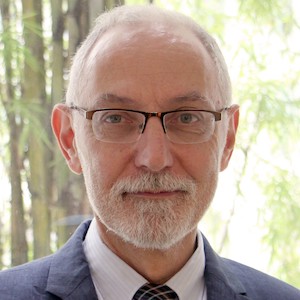
Dr Kostas Glinos is an independent expert in Science, Technology and Innovation policy. He has worked at the European Commission for 30 years, where he held management positions in the areas of Open Science, international R&D cooperation, research infrastructures, e-infrastructures, cyber-physical systems, future and emerging technologies and big research data. He has also developed and managed R&D funding programmes in several research domains. In 2017-2018 he was a Fellow at the Lee Kuan Yew School of Public Policy at the National University of Singapore. Before joining the Commission Kostas worked in the chemical industry in the USA and Belgium, lectured at the University and carried out research. He holds a PhD in engineering from the University of Massachusetts and an Advanced Professional Certificate in investment management from Drexel University. - Panel Discussion – Towards Open Access and Open Science: The role of Botswana Library and Information Centres in BotsREN. Panelists – Dr LEBELE, Ayanda (Botswana International University of Science and Technology), Dr ALPHEGE, Maisiri (University of Botswana), MAPHAKWANE, Naniki (Botswana Open University), Prof. NTOKWANE, Poloko (Botswana Institute of Development Policy Analysis), RADIJENG, Kgomotso (BITRI), SEANEGO, Jan (Botswana University of Agriculture and Natural Resources). Moderator: Prof. MOAHI, Kgomotso (Botswana Open University)Botswana public universities and research institutions have recently formed a research network known as Botswana Research Education Networks (BotsREN). Research and education networks require that libraries, information and knowledge centres must be critical partners. In Botswana, most of the centres have evolved into digital libraries and information centres. Such a move opens new opportunities especially in the support and advancement of Open Science through Open Access, Open Education, FAIR and Open Data. It goes without saying that digital libraries are central in the lifecycle of research with tenets of findability, preservation, interlinking, and re-use of research products and promotion of scholarly communication process. An interconnected, highly collaborative digital library system is therefore called for. It is from the foregoing that panel discussion shall focuses on the role of BotsREN libraries and information centres in fostering open science, open access, and playing a critical role in the creation, management, discovery and reuse of scholarship. The discussion shall provide a platform to dialogue on how Botswana Higher Education Institutions’ and research institutions’ libraries and information centres will contribute meaningfully to the (BotsREN) agenda.
Session Chair: Dr. Gregoire Njejimana
- Seismic shifts in the LIS infosphere: Futurising African libraries in the era of constant change – COLLENCE, T. Chisita
The library and Information Science (LIS) infosphere remain constant amidst the rapid technological changes that continue to shape the future of the industry. The infosphere refers to the dynamic environment in which people live including the sphere of human activity encapsulating the collection and processing of information, especially by computer. The yesteryear models seem to be losing ground due to the unprecedented technological developments, dynamic needs of diverse users, growing volumes of information being produced and proliferation of digital technologies for generating, processing and disseminating information. It is against this background that this chapter seeks to explore how digital technologies will determine the future of libraries. The chapter focuses on academic libraries from a selected developing country with regards to how they are adjusting to the technological changes in the LIS infosphere. It also seeks to find out the strategies they have adapted to remain relevant in an era of constant change and how they respond to the demands of putting people first. Using an interpretivist, the chapter will analyse the challenges and opportunities for academic libraries and librarians in an era of constant change. It will also explore the strategies in place to futurise the academic library from a developing country’s perspective. - Digital Literacy of Students, Library Staff and Faculty in Universities in Uganda and Nigeria: A Comparative Survey – A. OYELUDE, Adetoun (University of Ibadan, NIGERIA); AKULLO, Winny Nekesa (Public Procurement and Disposal of Public Assets Authority, UGANDA)
The introduction of new technologies has had a significant influence on teaching, learning, and research activities in universities. University libraries, as a result, have opportunities to provide information resources in a variety of formats. This study will investigate the digital literacy of students, library staff, and faculty in universities in Uganda and Nigeria comparatively. It specifically targets third-year and postgraduate students, library staff, not on ICT schedules, and faculty in non-ICT-related faculties in the universities. Awareness, usage, training, and access were explored. A survey method was employed and a structured questionnaire was utilized to solicit data. The study population will comprise students, library staff and faculty of universities in Uganda and Nigeria. The results will be analyzed using frequency mean and tables. Findings from the study will be presented, comparing the universities in the two countries. Recommendations will be made on the way forward for students, staff, and faculty of university libraries to further enhance their digital literacy skills for teaching, learning, and research.
- Digital resources awareness among students at National Institute of Public Administration in Lusaka – CHEMBE, Kaluba, NYIRENDA, Wezi, and PHIRI, Enos (National Institute of Public Administration, ZAMBIA)
The current study focused on establishing digital resources awareness among students at National Institute of Public Administration (NIPA) in Lusaka. Digital resources have been viewed to be flexible, because students can interact with resources they sought to consult. Learners in higher education might access digital resources from anywhere and anytime, especially with the availability of the Internet and other necessary technologies. However, there is scanty information about NIPA students accessing and utilizing digital resources. It is from that background that a study was conducted to determine the availability of these resources and how accessible they are to NIPA students. The specific objectives of the study were to: establish the accessibility of digital resources to students at NIPA in Lusaka; determine utilization of digital resources by students at NIPA in Lusaka; and lastly, to ascertain challenges faced by students at NIPA in accessing digital resources.This study used both qualitative and quantitative designs. The target population for this study were undergraduate students from NIPA. 367 was the sample size out of a population of 4300. However, only 239 respondents were able to respond to the questionnaire which had open and closed ended questions. This study collected qualitative and quantitative data from all the respondents. This study also utilized both primary and secondary data. Quantitative data was analyzed using Microsoft Excel while, content analysis was used to analyze qualitative data. The findings revealed 91.9% expressed knowledge of availability of digital resources; 2.1% indicated that digital resources were not available; and 5.9% did know of their availability. The current research also revealed that 90% utilized digital resources, 7.9% did not use digital resources; and 2.1% showed no knowledge of utilization. Therefore, it was concluded that the majority of NIPA students had access and utilized digital resource to their disposal. However, this study also found that students faced many challenges in accessing digital resources. 76% faced challenges in accessing digital resources compared to 23.7% who did not. The major challenge faced was interruption of electrical power supply.
- Open Educational Resources as the Panacea for Decolonisation of e-Learning Content. MNCUBE, Siphamandla, (University of South Africa, SOUTH AFRICA)
Globally, higher education institutions are advocating open educational resources (OER) for tuition and learning. South African and other African institutions realised the need for the adoption and development of OER to be appropriated in digital learning. However, there is an emerging need for decolonisation in different aspects including educational content. Yet, there is a lack of knowledge and theories concerning the decolonisation of e-learning content. This study sought to establish possibilities of decolonisation of e-learning content using OER. The study found that open distance e-learning institution advocates for OER. However, there is still a lack of strategies, policies, and practical guides for the decolonisation of e-learning content using OER. Therefore, the study proposed a decolonisation of the e-learning content model to be used by academia in the African context to progress the decolonisation of e-learning content.
Session Chair: Dr Nokuthula Mchunu, Africa Open Science Platform
- Academic Librarian Skill Sets in a Digitalized Learning Environment – NCHEMBA, Pauline (Levy Mwanawasa Medical University, ZAMBIA)
The digitalization process has brought about a paradigm shift to the research and education community across the globe. As African colleges and universities move to next level to create, new and innovative processes and capabilities based on current and emerging digital technologies, libraries are not spared. They too have to be digitalized. This move has implications on the librarians whose working environment and roles changes as new learning environments are created. This has posed challenges on academic librarians as they now need to develop new skills if they are to remain relevant and contribute positively in an environment where information accessing and curation activities for students and lecturers move into the digital space and with a much greater need for the librarians to understand how knowledge and knowledge pathways are being reshaped by a new and fast growing digital learning environment. Presented in the paper will be the key professional, technical and soft skills academic librarians should possess in order to implement creative, adaptive, proactive and innovative changes in the provision of information to support research and education. The paper will highlights the changing digital learning environment, how it has changed the functions of a library and the roles of librarians, the skills that librarians should possess in a digital learning environment, how librarians acquire these skills, challenges that are faced when acquiring these skills and when working in a digital library and a discussion on strategies to deal with the challenges. - Digitization of academic, financial and administrative management of the Bujumbura Light University – RUTOMERA, Pierre Claver, HAMIM, Hamisi, and MIRINDI, Marcellin (Universite Lumiere de Bujumbura, BURUNDI)
The management of student flows, their mobility between the various campuses/ academic institutions and the monitoring of student education pathways were some of the major challenges faced by the academic authorities as well as the ministry in charge of education. This was mainly due to the number of students and higher education institutions, which was growing rapidly, as well as the lack of adequate IT tools. A survey showed that the number of students in Burundi increased by 68.9% between 2013 and 2021 academic years while the number of public and private higher education institutions increased by 71.05% over the same period. However, until 2015, the use of IT tools in teaching/learning and in the management of academic activities still had a small place in Burundi. In 2014, one of the main recommendations of an analysis made on the state of the management of academic activities at our University was to gradually integrate the use of IT tools in teaching/learning and in administration to improving the management of academic activities; the data collection, access and sharing of the information. Since 2015, a team of three staff members has been charged to elaborate and to implement an IT software based on the recommendations of the analysis. The software named EDUSYS (education management system) has been written using open sources and has been deployed in 2018. EDUSYS is an online platform accessible 24/7 that allows all registered users to access different services depending on the category and access rights of each user.EDUSYS has six main sections. (1)The dashboard section displays the summary of statistical data of the University in the form of numbers, graphs and tables. The data in tables are exportable to pdf or excel format for further analysis. (2)The messaging module allows users to manage communication between students, teachers and staff members through mails and chats. (3)The academic services section contains the database of all students enrolled in an academic year, teachers and all undergraduate and postgraduate programs offered by the University as well as the results of all course evaluations. Students looking for their academic documents, and teachers submitting their online payment requests go through this same section. (4)The finance section deals with tuition fees and the payment of part-time teachers. (5)Configuration remains a section reserved for the platform’s Administration while (6)My EDUSYS is a section containing the profile data for each user registered in the database. Online registration application for new students is available on the homepage of EDUSYS before logging in. EDUSYS also contains advanced filters in the various sections mentioned above helping to generate automatic lists that can be exported to Excel and pdf formats. A biometric student card linked to EDUSYS has been distributed to students. This card interacts with several communication terminals thanks to the Near Field Communication (NFC) function. A mobile app allows students to better interact with the EDUSYS server.
The implementation of EDUSYS has enabled effective monitoring of the academic pathways of students during their studies, and easy access to the various services for all users. With EDUSYS, it has been much easier to control in real time, the number of enrolled students and to provide a better solution to the problem of managing tuition fees or paying honorariums for part-time teachers. Unforgeable academic documents are automatically printed from the database. Moreover, EDUSYS has been a good support tool providing reliable statistical data to the decision makers in real time. The digitization project at our University has been a success and today some higher education institutions are requesting to provide them with the software.
- Institutional Repositories as a Continuum in Scholarly Communication for Policy Decision Making Process – CHILONGA, Mpundu (Kwame Nkrumah University, ZAMBIA)
This study was undertaken to uncover the role institutional repositories in Policy and Decision-Making processes. The study undertook that the academic research produced institutions of higher learning, and archived on functional institutional repositories can play a significant role to enhance decision making, institutional direction and generally, the policy making processes in government ministries in Africa. It is an established fact that information is an important resource in decision-making. Organised and managed digital content of information in research repositories, generated by faculty, staff and students, provide an essential infrastructure, and are a missing link in digital research communication, that enhances the dissemination of intellectual output of an institution, to the bodies concerned in the governance structure.
The study established that; research sharing in universities and other institutions of learning have a role to play in policy implementation and institutional direction in government. It has been established that there was need to change the policy-makers’ perception of academic research and be able to understand the extent to which the social, political and economic environment can be influenced by the use of academic research. This would entail the establishment of mechanism to enhance access to academic research by the government ministries in the quest to enhance its utilisation.
- Digitization of a defense force training institution, Lessons learnt. The Case of Zambia Air Force Centre of Advanced Learning (ZAF CAL) – Dr CHAAMWE, Nchimunya (Copperbelt University, ZAMBIA) and SHABALENGU, Evans (Zambia Airforce Centre of Advanced Learning)
Advancements in ICTs have revolutionized the education system worldwide. The traditional or conventional teaching-learning approaches have given way to more modern, flexible and responsive approaches that make use of these ICTs. It is widely accepted that any organization or institution, either public or government needs to migrate to a digital way of doing things for it to achieve its business objectives and learning institutions are no exception. Learning institutions run by defense forces in Zambia have not remained behind and have joined this bandwagon of digitization. Zambia Airforce Centre of Advanced Learning, for example has in the recent past introduced eLearning platforms and in addition have modified traditional four walled classrooms in order for the school to offer real time online and offline content to students pursuing programs offered by the center. The school was established to advance careers of the ZAF personnel in order to keep them in their various professions to the fore and high on the Zambia Air Force Mission and Vision. In order to achieve its goal of achieving learning for efficiency, ZAF CAL has entered into partnerships with CBU, UNZA and NIPA. These partnerships are intended to produce graduates who will be able to compete with other graduates in similar fields at an international level. This paper highlights the digitalization process at the center. The paper dives into the center and covers the challenges and hurdles that were faced in the digitization process and also highlights the successes that were recorded. The paper further highlights the levels of digital adoption by staff teaching at the center.
Session Chair: Miriam Chahuruva, ZimREN
- Roaming Anytime Anywhere – MUHUMUZA, Fahadi and NAKAWUNGU, Hellen (RENU, UGANDA)
eduroam (education roaming) is a global Wi-Fi internet access roaming service designed specifically for users in the research and education communities. It provides secure and trusted network access to researchers, lecturers, teachers, and students who are roaming across eduroam-enabled institutions. Traditionally access to eduroam was within the institutions’ boundaries (campus eduroam), a challenge that was addressed through Metro eduroam deployment in Uganda. Metro eduroam proved to be very useful and successful in allowing students to continue using eduroam off-campus wherever there is an eduroam hotspot. Despite the fact that Metro eduroam made life easier for students and researchers, particularly during the COVID-19 lockdown, access points broadcasting eduroam are still only available in metro areas and in specific locations.
This creates many gaps in connecting the research and education community to a trusted network, particularly in non-urban areas, and users in urban areas must travel to specific access locations to use eduroam. The introduction of the eduroam on the Go service filled several gaps in the Metro eduroam service. With additional benefits such as expanding eduroam coverage beyond institutions and urban areas, as well as service mobility at any time. The R&E community no longer needs to be in a specific access area; instead, they can remain connected to the secure and trusted network while on the move.
- Supporting the Creation of New Identity Federations in Africa – MWOTIL, Alex (UbuntuNet Alliance of Research and Education Networks, MALAWI) and REALE, Mario (GEANT, NETHERLANDS)
Over the past year, UbuntuNet Alliance (UA), Arab States Research and Education Network (ASREN), West and Central African Research and Education Network (WACREN) under the three regional clusters of the AfricaConnect3 project, with facilitation from GÉANT, have been engaged in supporting establishment of new national identity federations in Africa. At the onset, the activity was mainly to address key issues in setting up and operationalizing new identity federations that include lack of technical competence on deployment of required components; lack of expertise to define policy components and governance models related to management of the federation; and information exchange gaps on federation best practices at the continental level. Through this collaboration, five new identity federations have been created with varying setup levels towards admission to the inter-federation service eduGAIN.This presentation will provide a field experience overview of spawning new identity federations in Africa with an aim to highlight the key barriers in setting them up, operationalization and uptake of federated identity management services. Additionally, the presentation will provide an update on the project’s activities on the identity federation setup dimension that include comprehensive training on Federated Identity Management, Identity Federations tools and procedures, including a hands-on component for participants from three regional clusters in Africa. The outcomes of the training activities and an overview of the eduID.Africa as an African catch-all federation will also be presented. The final part of the presentation will highlight the possible developments which could positively impact and ease the entire process and boost the adoption of Federated Identity Management and Identity Federations in Africa, for the benefit of Research and Higher education in the continent, mentioning key use cases which could benefit by the growth of federations in Africa. The two main topics that will be presented are technological developments supporting service deployment and operation; and existing or new use cases and applications able to attract new users and services.
- Using Managed IdP to Connect Small Institutions to Eduroam – NAKAKEETO, Claire and KAWUMA, Daniel (RENU, UGANDA)
Due to the COVID-19 pandemic, academic institutions were temporarily closed as a measure to reduce the spread of the virus. As a result, in a bid to continue tutoring their respective learners, online learning was adopted by a plethora of institutions. The core challenge that arose from the advent of online tutoring was the high cost of the internet incurred by the students and researchers when accessing the online resources. As a result, RENU quickly came in and introduced a myriad of solutions to combat the problem, the most prominent being; Metro eduroam (off-campus eduroam) which was intended to enable the NREN community access eduroam beyond institutional boundaries. Unfortunately, not all institutions (especially schools and small research institutions) had the budget to meet the requirements needed to setup eduroam, that’s a RADIUS server for managing authentications, a user database for managing user accounts plus the technical manpower needed to setup and manage the aforementioned servers. This was a big stumbling block that hindered small institutions from accessing and using the eduroam service. It’s no surprise that the uptake of eduroam in many institutions, especially schools had been low over the years since the inception of the service.It was for such institutions that the managed IdP service was invented. With the managed IdP service, small institutions within the RENU community can now join the eduroam community and utilize the service without worrying about the technical requirements. The managed IdP service is set up in a way that RENU handles all the technical load on behalf of the RENU community, and all the member institutions do is create eduroam accounts with the click of a button. This solution has brought a rapid increase in the uptake of the service. Before the inception of the service, only 12.4% of the RENU institutions had joined eduroam. At the time of writing this abstract, about 8% of the current RENU institutions have joined the eduroam community and are enjoying the
benefits of eduroam through the managed IdP service, and 8% more institutions are in the pipeline yet to be onboarded to the managed IdP service. This has consequently resulted in an increase in the amount of eduroam traffic on the RENU network. The overall goal of the presentation is to share with the African NREN Community the managed IdP architecture used, the challenges faced, the benefits of the rollout and the traffic patterns.
- Building and managing academic research computing infrastructure for universities in East and West Africa – MOYER, Brian, SSENTONGO, Lloyd, WHALEN, Christopher, ECONOMOU, Matthew (Research Data and Communication Technologies, UGANDA) and TARTAKOVSKY, Michael (National Institute of Allegy and Infectious Diseases, UNITED STATES)
Scientific computing infrastructure (cyber infrastructure) are a fundamental resource for research and educational institutions of higher learning. This consists of computing systems, data storage systems, advanced instruments and data repositories, visualization environments, and people, all linked together by software and high-performance networks to improve research productivity and enable breakthroughs not otherwise possible. However, these infrastructures cannot be self sustained. Thus, in high-income countries, scientific cyber infrastructure are directly funded by governments . Several examples include the European Open Science Grid, the US Advanced Cyber infrastructure Coordination Ecosystem Services & Support (ACCESS), and Japan’s High performance Computing Infrastructure. The maintenance of these infrastructure represents an enormous challenge for low to middle income countries. Indeed, the demands for computing and data storage will always be greater than that which can be provided by direct or even indirect funding for research grants. Therefore, African low-income countries face a dramatic challenge in providing their researchers and students, with access to low-cost cyber infrastructure. RDCT Uganda is an African and US owned company that works with the US National Institute of Allergy and Infectious Diseases to build two centers of excellence for bioinformatics and data intensive science in Mali and Uganda (ACE). These two centers at the University of Science and Technology in Bamako and Makerere University in Kampala rely on donated infrastructure and services from the NIAID and the US National Science Foundation (NSF) funded centers such as the Texas Advanced Computing Center and the Open Science Grid, as well as corporate donations and the National Research and Education Network community like RENU to deliver cyber infrastructure to faculty and students in both West and East/Central Africa.This presentation will discuss the experiences of our system administrators in delivering cyber-infrastructure services to the research community and the challenges that they have faced as well as the specific solutions they have developed and implemented. Some of these challenges include electrical costs, electrical stability, internet bandwidth/reliability, the training and development of knowledgeable staff to support the infrastructure, business continuity, monitoring, and management of the systems. Some of the topics we will discuss include immersion cooling, working with in-kind donors, geothermal cooling, and supporting three dimensional modeling technologies. Commercial cloud computing, while having reliability and cutting-edge capabilities, requires funding solutions that have so far proven incompatible with the African academic institutions for faculty, research, and teaching. High performance and high throughput computing is critical to all areas of scientific inquiry and it is a fundamental requirement for the African academic community to have access to infrastructure that meets their needs and their funding models.
Panel Session: Digital Research Technologies – Panelists: Dr SANSA-OTIM, Julianne, Dr NAKATUMBA-NABENDE, Joyce (Makerere University, UGANDA), NGABO, Desire (University of Rwanda, RWANDA), MBONIMPA, Nicholas (RENU, UGANDA), Dr NSABAGWA, Mary (Makerere University, UGANDA), BALAKRICHENAN, Sandoche (Afnic, FRANCE)
Data collection and processing are two important steps in the research process. In recent years data collection through the use of sensors has increased due to advances and lowering costs of sensor technology. Sensors are capable of collecting different types of data e.g. images, video, sound, motion, etc. Sensors enable the convenient collection of data from various sites simultaneously. Some of the most remote sites actually form the most interesting research sites yet are often left out of research studies as they are a great inconvenience. Sensors make it attainable to include such sites in research studies. If the setup also automates the transmission of the collected data from the sensors to a remote server then real time analytics are possible. LoRaWAN is a promising technology to allow low-cost last mile connectivity for sensors and internet of things (IoT) deployments into the NRENs.
IoT technologies currently operate as independent silos, and roaming is possible only if there are prior interconnection agreements. To our knowledge, there are no standardised procedures for interconnecting different IoT networks for roaming. IoTRoam has been set up as an operational roaming model that scales, seamlessly embedded to existing IoT infrastructures and interconnects on a global basis with minimum initial configuration requirement. As a Proof-of-Concept, Afnic have designed, implemented and tested (with Universities in France) a roaming LoRaWAN architecture using time-tested infrastructures in the Internet such as PKI (Public Key Infrastracture) and DNS. The IoTRoam experience has helped Afnic propose changes to the LoRaWAN Backend Interface Specification that have been accepted. They have also evaluated whether the proposed mechanisms satisfy constrained IoT requirements.
NRENs such as RENU, in collaboration with researchers, are now deploying LoRaWAN gateways to support this research need. Artificial intelligence (AI) and machine learning research require high-speed data processing and computation of large data sets involved. Commercial cloud services such as the Amazon web services (AWS) and Google Cloud have setups that meet this requirement excellently. The challenge, however, is the unsustainable monthly cost. Fortunately, NRENs such as RENU are beginning to provision cloud services that meet such needs.
The WIMEA lab setup typical data gathering sensors in field sites. Each site is a weather station designed with the objective of increasing the life of the sensor nodes. This is because these stations are deployed in remote off-grid locations powered by energy harvesting technologies. Furthermore, these locations are limited in the network connectivity options. Cellular connectivity is the most widely distributed and was adopted. Challenges experienced included: accessing SIM cards due to sim card registration requirements, sustaining the data costs beyond the project period and blockage of sim cards due to repeated sim activations. The WIMEA-ICT team collaborated with RENU in the deployment of the first LoRaWAN gateway for sustainable data transmission. Since the LoRaWAN radio frequency is a free license, there are no operational costs. The stations that are within the range of two existing LoRaWAN gateways have now moved over this transmission option, with anticipation of more gateways country-wide. Recent studies in Rwanda have also embraced the LoRaWAN technology with applications in bee monitoring and air quality monitoring. LoRaWAN networks with wide coverage are now needed to sustainably support transmissions from increasing IoT installations. Secondly the data presents new research challenges in terms of ensuring that despite the high data volumes, this data is transmitted to the remote servers for processing.
Researchers utilise commercial cloud service providers like AWS and Google Cloud Platform (GCP) to access high-performance infrastructure for cloud computing, data analytics & machine learning. This is through the provision of virtual machines that are elastic in nature and can be used for cloud storage and compute. When one creates a Google Cloud or AWS project, Google/AWS sets limits to the resources available for use. In some cases, the limits are insufficient for model training and for one to fully utilise these available compute, there is a need for them to request to have the cloud resources increased which is expensive. NRENs have a mandate to provide connectivity and other value-added services e.g. cloud services. Uganda’s NREN, RENU has since 2017 offered a cloud service to its members, which is mostly used for data storage. To support high-speed AI processing within the RENU cloud, efforts are being undertaken to acquire more GPU cores. The challenges include technical skills required to provision a high-performance cloud, pricing models for this new product and procurement delays. The main opportunities are the provision of a more affordable cloud storage and compute infrastructure that is closer to the researchers allowing them to have sufficient compute space for large datasets and efficient data processing closer to the point where it is created. The research community in Africa needs both LoRaWAN technology and High-performance clouds. This can readily be met by the NRENs since currently researchers use more expensive and sometimes less reliable options and if the NRENs carefully design cost-effective services, these will properly contribute to the much needed “beyond connectivity” NREN aspiration.
Session Chair: Prof Madara Ogot, UbuntuNet Alliance
- Keynote 1: NREN Maturity Models – JAUME-RAJAONIA, Sabine, International and Strategy Director, RENATER, FRANCE

Sabine JAUME is International and Strategy Director of RENATER, the French NREN. She joined the NREN community over 25 years ago. Sabine contributed to the early stages of the pan-European network GÉANT at project governance level. Committed to this R&E community, she has served as GÉANT board member and is involved in strategic committees. Convinced that NRENs are essential for R&E users which are at the heart of a fascinating digital transformation, Sabine is also driving RENATER’s collaborations with African partners. Indeed, it’s key for the future to all join forces, to ensure end-to-end secured connectivity to R&E users everywhere on the globe and a portfolio of performing services. - Keynote 2: The road towards a digital infrastructure for education – ROUSE, Paul, Chief Community Relations Officer, GEANT, UK

Paul ROUSE joined GÉANT in 2011 as Head of Procurement, leading and growing the procurement team, and quickly established himself as a highly effective, professional and valued member of the community. In that time he has overseen extensive procurement activity relating not only to the pan-European GÉANT network where he has secured extensive savings, but has also played a central role in the success of GÉANT’s Infrastructure-as-a-Service framework, as well as supporting research community engagement with EUMETSAT, ESA and ESnet. In fact, Paul’s involvement and influence continues to benefit numerous projects and initiatives across Europe and beyond, including the Eastern Partnership Connect project EaPConnect, the Collaboration Asia-Europe-1 (CAE-1) 100Gbps link between Singapore and London, as well as the BELLA submarine cable linking Europe and Latin America. Prior to GÉANT, Paul held several procurement roles in commercial and public sector organisations and is a member of the Chartered Institute of Purchasing and Supply. He holds a BSc in Technology and Management Science, Business and Technology. Paul was appointed Chief Community Relations Officer in early 2020, and is responsible for Partner and Stakeholder Relations, International Relations, Research Engagement, Community Support, and Learning and Development. - Keynote 3: Equity, Access and Visibility of a digitalized African College and University: Are we there yet? – MAWIRE, Blessing, Partnerships Coordinator: Hidden Collections Initiative, Council on Library and Information Resources (CLIR), Alexandria, VA (Based in Pretoria, South Africa)

Ms MAWIRE has experience working in Sub-Sahara Africa in the areas of Project Management, Strategic Innovations, Capacity Building, Knowledge Management, Heritage Assets Management, Digital Inclusion and Critical Appraisal of Evidence. Over her career, Blessing has led the implementation of multi-country/regional projects across Sub-Saharan Africa and worked with diverse global partners from community-based organizations, research institutions, governments and United Nations agencies. Ms Mawire has strong experience in designing information and knowledge management approaches tailor-made for specific communities with a focus on sustainable impacts. Particularly, she has expertise in areas of digital access and inclusion for low resourced communities and bridging the knowledge divide. Her experience extends to strategy development, team management, partnership building, policy dialogue, monitoring and evaluation (including data collection and analysis), management of online communities of practice, technical writing, using sustainable development approaches, and development of youth programmes.
- Closing Session
- Local Organising Committee Chair
- Chair and CEO Botsren
- CEO UbuntuNet Alliance
- Chair UbuntuNet Alliance
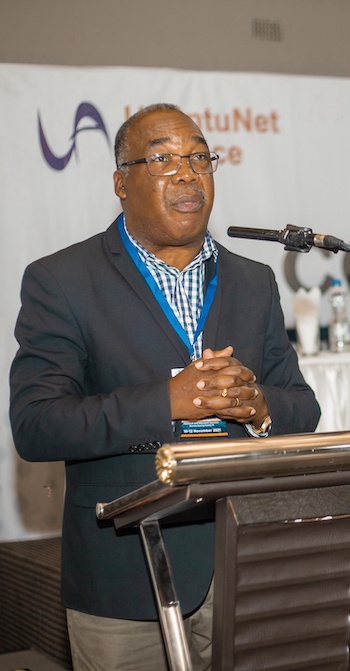
Who Should Attend/Why should you attend?
- College and University ICT Directors (or equivalent) and Librarians – Opportunity to present on the extent of digitalisation in your institution, learn from others as well as gather information and hold discussions on challenges faced, potential digital solutions, and opportunities for collaboration.
- Researchers, academics, students – Share how you are using digital technologies and the UbuntuNet Alliance/NREN research and education network to support your research, teaching and learning as well as on future directions. Provides opportunities to learn and form new collaborations across the continent.
- Government officers (related to ICT and Education) –
Expound on your government’s current and future policies, actions, and plans in stimulating the redesign of digitalised African universities. Gives you an opportunity to learn from what is happening in other countries. - Private/Industry – Present case studies on the emerging digital technologies in support of the digitalised African University. You have the opportunity to learn and discuss about the challenges universities face, present solutions, seek potential business.
- NREN Community – opportunity to listen to the voice of the customer and learn areas where the services offered by NRENs can be catalyst of and anchor of the redesigned digital college and university.
Important Timelines
- April 18, 2022 – Opening Call for Paper Presentations and Panel Proposals
- June 20, 2022 – Opening Early Bird Registration
- July 31, 2022 – Close Call for Paper Presentations and Panel Proposals
- August 31, 2022 – Paper presentation and Panel Proposal Notification
- September 30, 2022 – Close Early Bird Registration
- EXTENDED November 6, 2022 – Close Regular Registration
- November 24-25 – UbuntuNet-Connect 2022
Key Links
Sponsorship
UbuntuNet-Connect 2022 presents a rare opportunity for companies to meet Africa’s research and education networking community and market their products and services. This is especially important to organisations and companies with a national, regional or global footprint.
Reasons to Sponsor
- Thought Leadership – Position your products, services, and executives as key players in the research and education community.
- Networking – Gain face-to-face access and directly contact typically hard to reach decision-makers and education community.
- Branding – The sponsorship will give your company or organisation visibility that it needs in the African research and education community.
The full sponsorship packet can be downloaded from here.
Venue
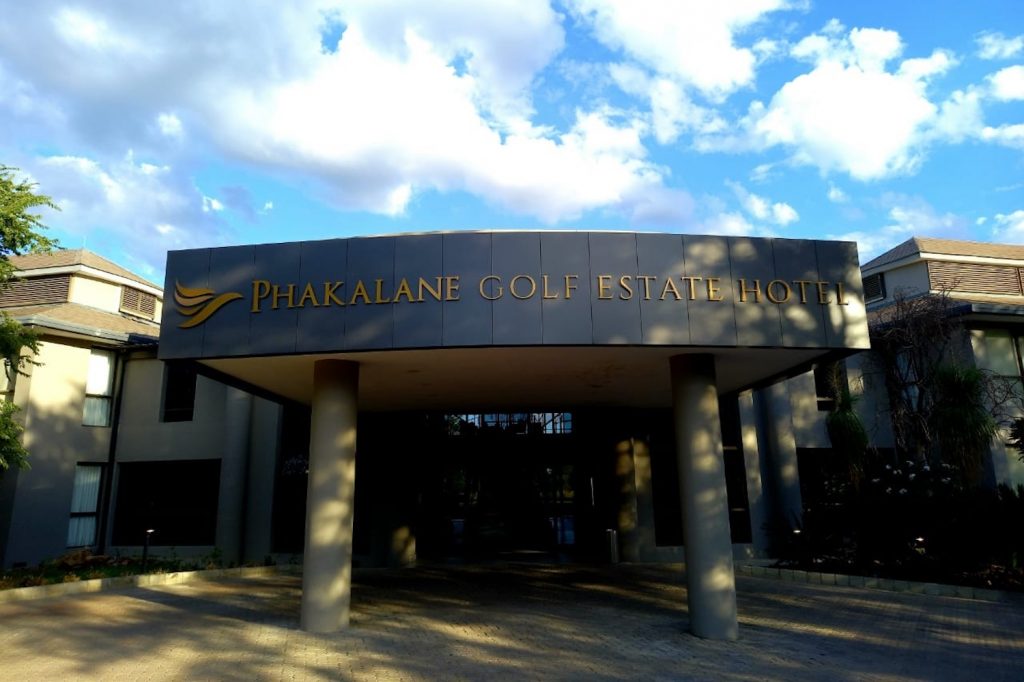
Phakalane Golf Estate and Hotel Resort
The hotel, located 15km from Gabarone City Center, features an 18-hole golf course. Gabarone, the Capital of Botswana, is a hub of social and economic activity.
More details and reservations at:
Registration
Early Bird Registration (June 20 – September 30, 2022):
From Institutions in Africa: $100
Rest of the World: $200
Regular Registration October 1 – November 1, EXTENDED: November 6, 2022):
From Institutions in Africa: $150
Rest of the World: $300














